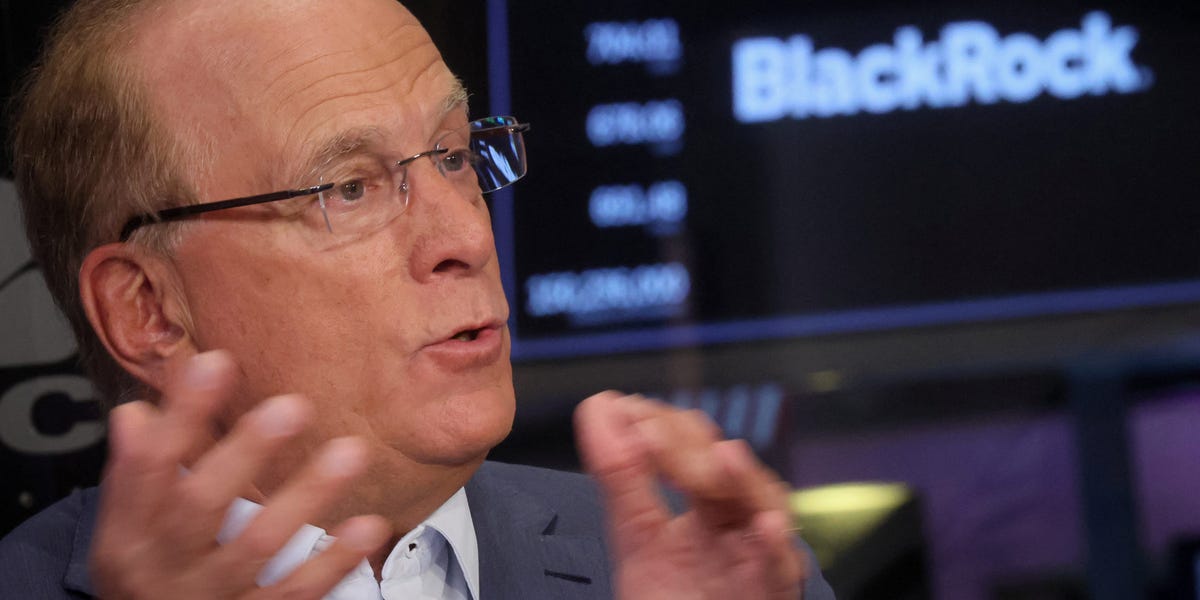- Last fall, BlackRock filed to launch an ESG municipal bond exchange-traded fund.
- The fund hasn’t yet launched while sustainable investing has become a flashpoint on Wall Street.
- A data provider tied to the ETF had named Larry Fink among the most overpaid chief executives.
Late last September, BlackRock did something it’s done hundreds of times before: it filed an application with the Securities and Exchange Commission to launch a new exchange-traded fund. The prospectus described a fund that considers environmental, social, and governance factors while giving investors exposure to state- and local government-issued bonds. It is in essence an ESG version of its major $32 billion municipal bond fund.
ETFs often launch within a few months after a fund manager’s initial paperwork, and delays are not uncommon. The SEC typically responds to ETF providers’ initial filings within about three months.
But BlackRock has filed to extend the period for debuting the iShares ESG Aware ICE-HIP Muni Bond ETF nearly every month since last fall, filings show. The delay for the world’s largest ETF provider has puzzled some in the industry.
“That’s pretty common for more entrepreneurial, small shops. But for monster firms, I don’t see it that often,” said Wesley Gray, chief executive of ETF firm Alpha Architect, referring to such extensions to launch ETFs.
The delay comes as ESG investing criticisms have unfolded most potently at the state level. Critics including a string of state attorneys general and vocal lawmakers have taken aim at the New York-based money manager, the largest in the world, over its ESG investment approach. Republican presidential candidates in the US are denigrating ESG as a concept on the campaign trail, politicizing sustainable investing.
BlackRock has become the most high-profile target for such backlash as the biggest ETF provider with some 1,300 ETFs that together have $3.2 trillion of assets under management. It responded to attorneys general from Arizona, Texas, South Carolina, and 16 other states last year by saying that its participation in ESG-related initiatives is in-line with its fiduciary duty. A BlackRock spokesperson declined to comment for this story, citing filing period restrictions.
“That is rare for a shop like BlackRock,” said Matthew Tuttle, the CEO and chief investment officer of Connecticut-based ETF provider Tuttle Capital Management.
“To me, the reason BlackRock is going to delay something is — they’ve got an idea that a year ago sounded great, played well in the landscape. Everybody was going after ESG. Quite honestly, from an ESG standpoint, a muni bond investing in ESG states is brilliant,” he said. “It’s an idea that I don’t think is going to be nearly as well-received today.”
BlackRock competitors have launched similar funds. This year Goldman Sachs launched its first municipal bond ETF, which takes into account social and environmental factors.
Fink recently said he stopped using “ESG” because it’s grown weaponized, while a report from BlackRock on Wednesday said it supported just 26 of 399 shareholder proposals tied to climate and other environmental matters this proxy season as it says the quality of proposals declined overall.
BlackRock has launched sustainably labeled products recently. The firm said that it debuted more than 50 sustainable ETFs and index mutual funds in the US and other markets last year, and overall it has 254 sustainable ETFs globally with 40 of those listed in the US. BlackRock’s ETF and index investments business, led by Salim Ramji, drew $220 billion of net inflows last year.
“From a product development perspective, it is good practice to check in throughout the process and make sure the product that is being developed or launched is still satisfying the need that was originally identified,” said Tony Kelly, a former BlackRock and Goldman Sachs ETF executive who cofounded the fixed-income ETF provider BondBloxx. “A lot can change in the time from a decision to pursue an idea through to launch.”
BlackRock’s ESG municipal bond ETF has another wrinkle.
The fund tracks the investment results of an index developed by the index giant ICE that uses ESG factors based on metrics provided by HIP Investor, a research and ratings firm that evaluates investments’ impact. (Like many ETFs, this BlackRock ETF explicitly does not seek to be an “impact” fund that generates positive change but rather takes into consideration ESG factors that pose risks to companies.)
Each year since 2015, shareholder advocacy nonprofit As You Sow and HIP Investor have published an annual list of CEOs they find are “overpaid” relative to their companies’ performance and other factors including shareholders’ votes against CEO pay packages.
This year and last year, Fink was ranked at 30 and 33 out of 100 executives, respectively. HIP Investor and the SEC did not return requests for comment.
Read the full article here





